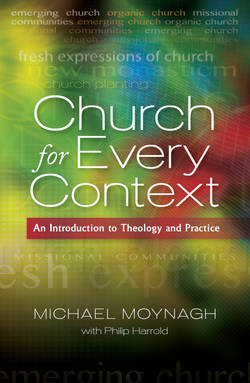Читать книгу Church for Every Context - Michael Moynagh - Страница 19
На сайте Литреса книга снята с продажи.
Resources
ОглавлениеChurch for Every Context draws on a variety of material. It is informed by over 150 case studies compiled by the UK national team, Fresh Expressions6, by the Sheffield Centre’s important Encounters on the Edge series of studies, and by other examples of contextual church with which I am familiar.
It draws on an extensive body of literature arising from the four tributaries of church planting, emerging church, fresh expressions of church and communities in mission. Within this are case studies and case study-based reflections such as Glasson (2006), Male (2008), Gibbs and Bolger (2006) and Gray-Reeves and Perham (2011); contributions to the debate about the validity of these new forms of church, such as some of the essays in Croft (2008b) and Nelstrop and Percy (2008); introductions to specific types of church, such as organic church (Cole, 2005) and mid-sized communities (Breen and Absalom, 2010); studies that address particular themes or issues, such as liquid church (Ward 2002) and new monasticism (Cray, Mobsby and Kennedy, 2010).
Church for Every Context also dialogues with wider streams of theological literature, not least on the nature of the church, the mission of God, contextualization, the church as the carrier of the Christian story, and Old and New Testament studies. In addition, the book plunders insights from commercial and social entrepreneurship to throw light on how contextual churches start and grow, and draws on complexity theory, especially complex responsive process theory, which emphasizes the role of conversations in organizational life.
I write as a Church of England minister who is a member of the UK’s national Fresh Expressions team, which since 2005 has encouraged new forms of church for a fast-changing world.7 This inevitably means that my perspective has something of an institutional feel. However, the church is not primarily an institution, but a variety of interlocking relationships. History is full of ecclesial institutions emerging and dying. There is nothing sacrosanct about today’s denominations. So although I write from within one particular institution, which I believe still has something to offer the world, I have sympathy for critical voices outside the denominations. My passion is the mission of the church.
Like many in the emerging church conversation, I have a low-church evangelical background, but in the early 1990s my journey took me to a more sacramental church, where we pioneered – in today’s language – several fresh expressions of church. Though my voyage resonates with many in the conversation, I have not travelled to the radical shores a number have reached. Some in the conversation would think me rather tame, whereas several of my evangelical friends would wonder if I was conservative enough.
I have used the phrase ‘new contextual church’ to span churches founded by people who would describe themselves as conservative evangelicals, Anglo-Catholics, radical emergents, new monastics or some other label, while being willing to stand under this umbrella term. The book is an apologetic for these new types of church within the mixed economy.
